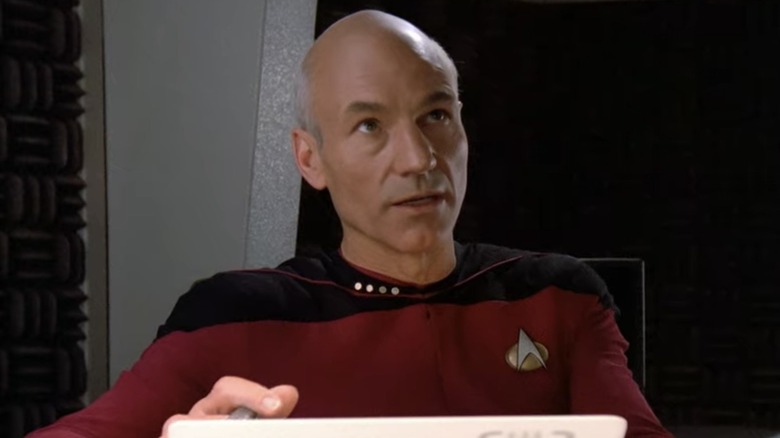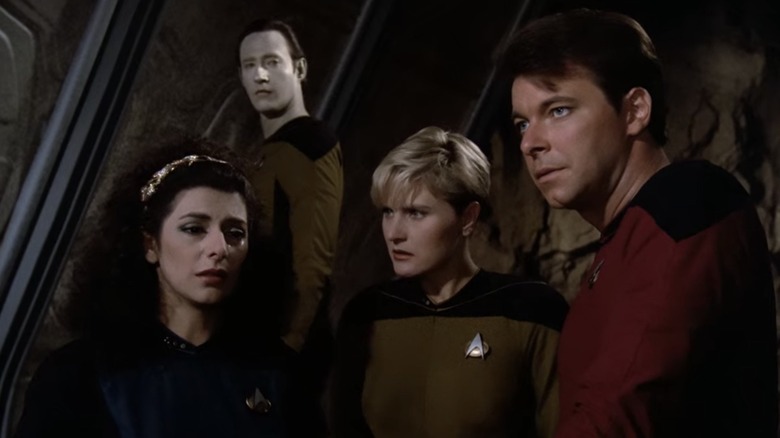Why Star Trek: The Next Generation Seemed Doomed To Fail
"Star Trek: The Next Generation" is one of the greatest television shows of all time. But it wasn't considered a surefire success, despite the fact that it was reviving an established property with a built-in fanbase, the way so many movie and TV franchises have attempted to do in the 21st century. "The Next Generation" premiered in 1987, over 20 years after "Star Trek: The Original Series" had begun its three-season run on NBC under creator Gene Roddenberry. Low ratings led to the cancellation of "The Original Series" in 1969, but it would find new life (and new civilizations) in '70s syndication, developing a cult following through reruns that has since ballooned into one of the biggest fandoms in the world.
In an oral history of "The Next Generation" for Entertainment Weekly, supervising producer Rick Berman outlined some of the reasons why the series was considered a risky venture at the time, even with so many Trekkies out there already. He said:
"There were three reasons not to do it. One, this was a sequel, and sequels on television had never been successful. Two, it was science fiction, and in the 1980s science fiction was not successful. And three, it was going to be syndicated, not a network program."
Though syndication was integral to "The Original Series" growing its audience, it seems that it was still not viewed as an advantage, perhaps because it was perceived as less prestigious than primetime. Berman also makes the distinction that it was specifically television sequels that were not successful. The cast of "The Original Series" had already made the warp jump to the big screen in 1979 with "Star Trek: The Motion Picture," and there were three movie sequels that followed before "The Next Generation" made its debut.
Paramount viewed it as a one-and-done pilot
The attitude seemed to be that what worked for movies wouldn't necessarily work for TV, especially since it had already failed to draw ratings once before and been canceled. What's ironic is that some modern Trekkies might now feel the opposite is true: that "Star Trek" went too Hollywood with the 2009 J.J. Abrams film reboot, when it's actually tailor-made for television, where it had its roots in Roddenberry's idea of doing "Wagon Train to the stars."
At the time, however, the franchise did not have the same long, multi-show history that it does now. Production designer Herman Zimmerman told EW that there was not a lot of confidence behind the "The Next Generation," at first. He said, "The rumor around the [Paramount] lot was that this was another one of Gene Roddenberry's attempts to re-create his original television series and as such was probably not going to be anything more than a pilot."
Even Denise Crosby, the actress who played Lieutenant Tasha Yar, and later, her half-Romulun daughter, Sela, was initially skeptical of "The Next Generation." Crosby revealed that she originally read for the part of Deanna Troi — which Marina Sirtis ended up winning — but alien words like "Betazoid" just "sounded so gobbledygook and weird" to her. She was also not excited about the prospect of starring in a rehash of some old '60s show. She said:
"I thought, 'Oh, no, come on, you've got to be kidding me. Who's going to watch this? Why do they just keep regurgitating old ideas?' I just thought it sounded so rinky-dink. But I thought, 'Well, who am I to turn down work?'"
Zimmerman, for one, was won over by Roddenberry's humanism after meeting him, so much so that his "whole attitude changed dramatically." Thankfully, "Star Trek: The Next Generation" proved the skeptics wrong and went on to enjoy immense success, lasting seven seasons — four more than "The Original Series" — and leading to further spin-offs such as "Deep Space Nine." "Star Trek" could have easily kept the smaller cult status of a show like "Twin Peaks," but it's really because of "The Next Generation" that it was able to make a strong comeback on TV and develop into a whole fleet (or Starfleet) of shows.

